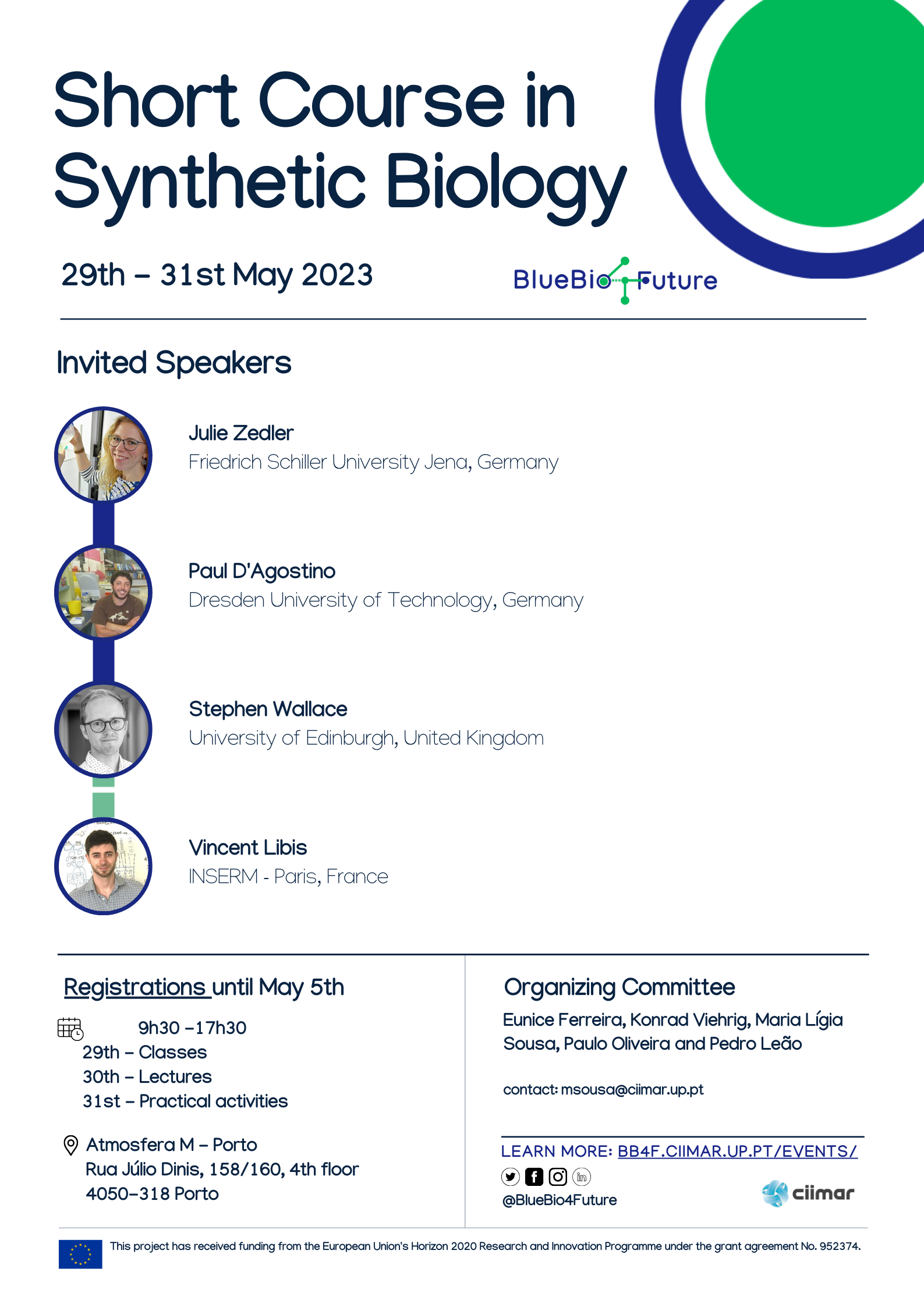BlueBio4Future Training Courses
29th May to 31st May |
Atmosfera M – Porto
Rua Júlio Dinis, 158/160, 4th floor
4050-318 Porto
Registrations for the Short Course in Synthetic Biology are open!
The purpose of these courses is to equip CIIMAR researchers with cutting-edge biotechnological research knowledge in Green Chemistry/Biocatalysis, Synthetic Biology, Bioinformatics, and Bioprocesses/Bioreactors.
This first course introduces the area of synthetic biology and its underlying natural scientific and engineering basis. It will be focused on synthetic biology, emphasizing core ideas of using an engineering-driven approach to speed up the design-build-test loops required for modifying existing biological systems and creating new ones.
The three-day training will be divided into teaching sessions on the first day, which will cover the fundamentals of synthetic biology.
On the second day, we will have invited speakers who will share with the audience of their most recent research and knowledge. Students will have the opportunity to interact closely with these researchers.
Students will be challenged with hands-on training on the last day.
Click here for registration!
Registration deadline: May 5th, 2023.
Vacancies are limited.
For course attendance, the CIIMAR community gets preference.
Find here additional details on the invited lecturers!
Julie Zedler completed her PhD in the Colin Robinson Lab at the University of Kent in the United Kingdom. There, she investigated the potential of microalgae as a cutting-edge platform for the development of recombinant proteins and high-value compounds and engineered a different route for more effective carbon fixation in model cyanobacterial systems. Julie’s study focuses on developing molecular engineering tools to increase the yields of microbial products.
She currently holds a junior professor position at Friedrich Schiller University Jena (tenure track).
Paul D’Agostino obtained his PhD from the Western Sydney University (formally University of Western Sydney) in 2014 which focused on comparative genomics and proteomics of saxitoxin-producing cyanobacteria. After completing his PhD he had postdoctoral positions first at the University of New South Wales (Australia) followed by the Technische Universität München. At the moment, Paul is at the Technische Universität Dresden where he has started to develop his independent research on the discovery of natural products using genome mining, direct pathway cloning, and heterologous expression of cryptic pathways with a focus on symbiotic cyanobacteria.
Stephen Wallace completed his PhD in Organic Chemistry at the University of Oxford’s (University College), where he worked on the total synthesis of Gephyrotoxin family of compounds.He moved to Cambridge in 2012 to begin a Career Development Fellowship in Professor Jason Chin’s lab at the MRC Laboratory of Molecular Biology. He developed several strain-promoted Diels-Alder click reactions for the site-specific labeling of proteins in E. coli using AMBER stop-codon suppression. Stephen then moved to Harvard University’s Department of Chemistry and Chemical Biology in 2014, where he worked in Prof. Emily Balskus’ lab. He created abiotic, non-enzymatic processes to be used with metabolically modified bacteria. In 2017, Stephen accepted a position as a Lecturer in Biotechnology at the University of Edinburgh. There, he has been conducting independent research at the intersection of synthetic chemistry and synthetic biology. He was assigned in 2019 to the California Institute of Technology’s Department of Chemical Engineering, where he collaborated with Prof. Frances Arnold on the directed evolution of enzymes. Stephen received a UKRI Future Leaders Fellowship in 2020 to support his work on the sustainable synthesis of industrial chemicals using a combination of chemical catalysts and engineered microorganisms.
Vincent Libis obtained his PhD at the Institute of Systems and Synthetic Biology – CNRS Institute on the subject of “New inputs for synthetic biological systems” while working with the BioRetroSynth research team. After completing his doctorate, he worked as a postdoctoral researcher at Rockefeller University, developing scalable methods for the discovery of biologically active compounds with Prof. Sean Brady, at the Laboratory of Genetically Encoded Small Molecule. One of his most notable findings was related with the exploring and exploitation of the biosynthetic potential of rare metagenomic DNA using network analysis of targeted sequences.
He just became the leader of the research group at INSERM in Paris, France, where he is focusing on the development of synthetic biology techniques for the identification of bioactive compounds.



